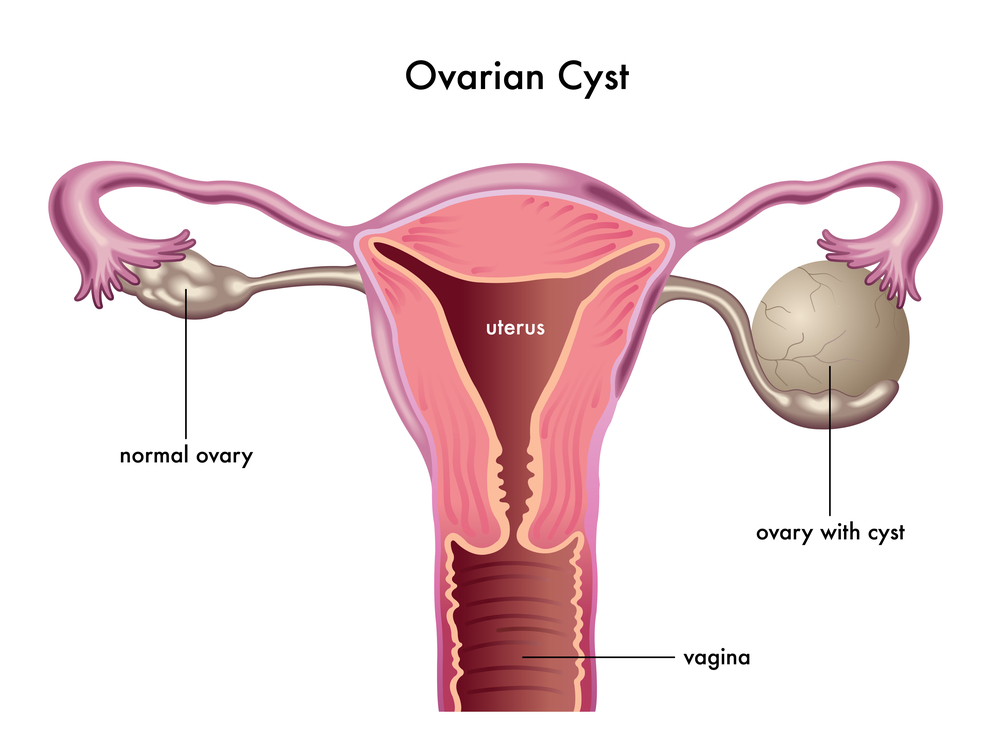Ovarian cysts are more common than you may think. Ovarian cysts are fluid filled sacs that form on the inside or outside of the ovaries. Cysts can happen on either one or both of your ovaries. They are usually harmless and will go away on their own. They most commonly happen during your menstrual cycle and will disappear after your cycle is done.
There are many different types of ovarian cysts; follicular cyst, corpus luteum, dermoid cyst, teratoma cyst, cystadenomas, endometriomas, or functional. Ovarian cysts can rupture or burst. If the cyst is larger in size it is more likely to burst. A cyst can also rupture during sex or intense exercise.
Risk Factors
Some people are at a higher risk of developing these ovarian cysts.
- If you have hormonal problems, this could be hormonal unbalance, PCOS, or another condition that causes your hormones to be out of whack.
- If you are using the fertility drug clomiphene.
- Pregnancy can cause you to have a higher risk of developing a cyst.
- Endometriosis can cause cysts.
- Developing a severe pelvic infection or if you have had previous ovarian cysts.
Symptoms
Ovarian cysts may cause no discomfort or pain. Many people don’t know they even have a cyst until it ruptures. When an ovarian cyst ruptures the first clue is sudden severe abdominal pain. Some people have mistaken the pain for an appendicitis attack.
Other symptoms can include, pain accompanied by fever or vomiting, feeling cold and clammy skin, fast breathing, lightheadedness, dizziness, weakness, bleeding from vagina, pain during sex, tenderness in pelvis, shoulder pain, irregular menstrual cycle, and fluid buildup in abdomen.
Diagnosis
If you have sudden onset abdominal pain you will want to see a doctor or go to the emergency room. Your doctor will want to run a lot of different tests to rule some other causes out first. Depending on when your cyst ruptures there may be no indication that there even was a cyst. Your doctor can do an ultrasound though to check for excess fluid in the pelvis which is usually a sign of a ruptured cyst.
Other tests may include a pregnancy test, and complete blood work. Your doctor may want to take a urine sample to rule out kidney stones or a UTI.
A CT or MRI may need to be done if a clear picture of the abdomen can’t be retrieved by the ultrasound. In severe cases your doctor may need to do a laparoscopic surgery to see closely if there are other cysts or if there is a sign of cancer.
Endocervical swab can be done as well to check for pelvic inflammatory disease.
There are other conditions that can have similar symptoms to a ruptured ovary, so it is important to get checked out to rule out any other possibilities. Conditions are ectopic pregnancy, endometriosis, pelvic inflammatory disease, appendicitis, kidney stones, irritable bowel syndrome, irritable bowel disease, diverticulitis, or UTI.
Depending on where your ovary is located it can cause discomfort when having a bowel movement, this is usually the case when the cyst has grown rather large and is disrupting the nerves.
Treatment
In most cases a ruptured ovarian cyst requires no medical intervention. The fluid will get absorbed in your body, and the pain will decrease. You can take over the counter pain medications to help with the pain, and any tenderness that may follow. Hot packs, heating pads, or a warm bath can also help with pain and tenderness. Complete pain should go away in a week or two.
In some cases though a ruptured cyst can cause some complications. Heavy, ongoing blood loss, ovarian torsion where the ovaries twist, severe infection, persistent pain, or other signs of cancer may be cause for further treatment.
If your pain is persistent and it seems as though you are losing a lot of blood you need to see your doctor immediately. They will want to admit you to the hospital for further monitoring. Your doctor will be able to give you IV pain medication as well as IV fluids. If necessary a blood transfusion can be done.
In severe cases where the cyst was rather large, there is persistent pain, signs of cancer, or ovary torsion surgery may be needed. The surgeon can go in to remove excess fluid, remove remainders of the cysts, untwist the ovaries, remove other cysts if cancer is a possibility or take a biopsy.
Takeaway
There is no way to prevent yourself from developing an ovarian cyst. Having regular check ups with your doctor can help diagnose one before it ruptures. Your doctor may want to wait and see if it goes away on its own before intervening though. If it is causing discomfort or pain already they may suggest allowing them to go in laparscopically and removing the cyst.
Ovarian cysts can be extremely painful when they rupture, if pain does not subside right away you will want to see your doctor or go to the emergency room immediately.
Do you need hormone help?
Women Best Capsules is a synergistic blend of foods and herbs that provide value specifically for the female body. It contains a unique blend of mushrooms that have a long traditional use in Asia in supporting healthy and balanced hormone and energy levels and a long and healthy lifespan.
Sudden severe abdominal pain is a symptom or an ovarian cyst rupture! Women with hormonal problems are at higher risk! #HealthSurgeon
Sources:
https://www.hopkinsmedicine.org/health/treatment-tests-and-therapies/management-of-ruptured-ovarian-cyst#:~:text=You%20may%20need%20care%20in,ovarian%20cyst%20may%20need%20surgery.
https://www.mayoclinic.org/diseases-conditions/ovarian-cysts/symptoms-causes/syc-20353405
https://www.webmd.com/women/what-to-know-about-ruptured-ovarian-cysts
https://health.clevelandclinic.org/when-an-ovarian-cyst-ruptures-is-it-an-emergency/
https://www.verywellhealth.com/what-happens-if-i-have-a-ruptured-ovarian-cyst-2616648
https://www.medicalnewstoday.com/articles/ruptured-ovarian-cyst#Complications
https://www.healthline.com/health/how-do-i-tell-if-i-have-a-ruptured-ovarian-cyst#complications
Did You Know?
- 1The current prices for the Entire Platinum Line as of April 19th, 2024 are Here
- 2This Ultimate Transformation has people losing between 5 and 20 pounds.
- 3You can Protect your healthy gut with this.
- 4Platinum Products are organic and GMO free.
Platinum Top Sellers









